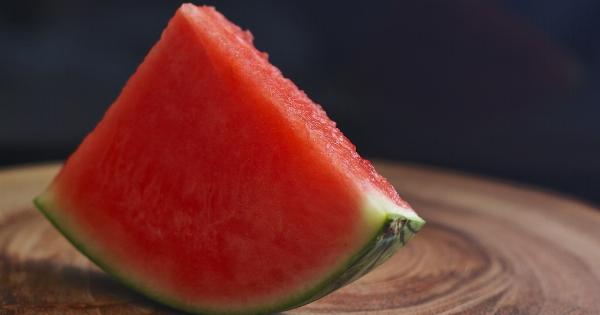As the temperatures rise and the days get longer, there’s nothing quite like biting into a juicy, refreshing melon on a hot summer day.
But did you know that melons are not only delicious, but also packed with health benefits? From hydration to digestion to glowing skin, melons are a true superfood that deserve a place in your summer diet.
A Brief History of Melons
Melons have been cultivated for thousands of years, with evidence of their consumption dating back to ancient Egypt and Greece.
The sweet fruit was highly prized for its refreshing properties, and was often served as a dessert or used in medicinal remedies. Melons eventually made their way to Europe, where they became a symbol of luxury and were favored by royalty and the wealthy.
The Nutritional Benefits of Melons
While melons are often thought of as simply a delicious summer treat, they actually pack a powerful nutritional punch. Here are just a few of the health benefits that melons provide:.
1. Hydration
During the hot summer months, staying hydrated is essential for overall health and well-being. Melons are over 90% water, making them an excellent way to quench your thirst and replenish your body’s fluids.
In fact, just one cup of diced watermelon provides around a quarter of your daily water needs.
2. Digestion
Melons are also a great source of dietary fiber, which is essential for digestive health. Fiber helps to regulate bowel movements, prevent constipation, and promote the growth of healthy gut bacteria.
Just one cup of diced cantaloupe contains around 2 grams of fiber.
3. Skin Health
The high water content in melons also makes them great for your skin. Staying hydrated is essential for maintaining healthy, glowing skin, and the vitamins and minerals in melons can help to nourish and protect your skin from the inside out.
Melons are a rich source of vitamins A and C, both of which are important for skin health. Vitamin A helps to promote the growth of healthy skin cells, while vitamin C is essential for collagen production, which keeps skin looking firm and youthful.
4. Immune System Support
The vitamins and minerals found in melons also provide a boost to your immune system.
Vitamin C is known for its immune-boosting properties, while vitamin A helps to maintain the integrity of your skin and mucous membranes, which act as a barrier against pathogens. Melons are also a good source of potassium, which is important for healthy muscles and nerve function.
5. Weight Management
For those looking to maintain a healthy weight, melons are a great choice. They are low in calories and fat, while also being relatively high in fiber and water content, which can help to keep you feeling full and satisfied.
In fact, studies have shown that incorporating melons into your diet may help to reduce overall calorie intake and promote weight loss.
The Different Types of Melons
There are many different types of melons available, each with their own unique flavor and nutritional profile. Here are a few of the most popular varieties:.
1. Watermelon
Watermelon is perhaps the most well-known type of melon, and for good reason. It is juicy, sweet, and incredibly refreshing, with a high water content that makes it perfect for hot summer days.
Watermelon is also a good source of vitamins A and C, as well as the antioxidant lycopene.
2. Cantaloupe
Cantaloupe, also known as muskmelon, has a sweet, fragrant flavor and a soft, orange flesh. It is rich in vitamins A and C, as well as potassium and other minerals.
Cantaloupe is also a good source of dietary fiber, with just one cup of diced fruit providing around 2 grams of fiber.
3. Honeydew
Honeydew melon is a pale green, slightly sweet fruit with a juicy, succulent flesh. It is a good source of vitamins C and K, as well as potassium and other nutrients.
Honeydew is also relatively low in calories, with just one cup of diced fruit providing around 60 calories.
4. Galia Melon
Galia melon is a type of cantaloupe that is highly aromatic and flavorful, with a juicy, sweet flesh. It is a good source of vitamins A and C, as well as potassium and other minerals.
Galia melon is a relatively new variety, first developed in Israel in the 1970s.
How to Incorporate Melons into Your Diet
There are many ways to enjoy melons during the summer months. Here are a few ideas:.
1. Fresh Melon Slices
One of the simplest ways to enjoy melons is to slice them up and enjoy them fresh. Try refrigerating your melon before slicing for an extra refreshing treat.
2. Fruit Salad
Add diced melon to your favorite fruit salad recipe for a sweet, juicy boost.
3. Smoothies
Blend up a refreshing smoothie by combining melon with other fruits, greens, and a liquid of your choice.
4. Grilled Melon
For a unique twist, try grilling sliced melon and serving it with a drizzle of honey or a sprinkle of sea salt.
5. Frozen Melon Popsicles
Puree melon and freeze in ice pop molds for a refreshing and healthy summer treat.
Conclusion
When it comes to summer superfoods, melons are definitely at the top of the list. With their high water content, fiber, vitamins, and minerals, they provide a range of health benefits while also being delicious and refreshing.
Whether you enjoy them fresh, in a smoothie, or grilled, be sure to incorporate melons into your summer diet for a healthy and flavorful boost.






























